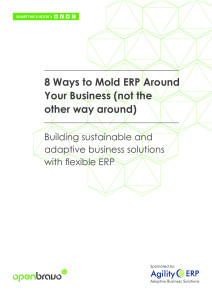Synopsis: This paper explores how modern, flexible ERP solutions enable businesses to adapt their systems to dynamic needs rather than forcing the business to conform to rigid ERP frameworks. It highlights the importance of flexibility in ERP systems to foster business agility, enhance operational efficiency, and support growth in rapidly changing markets.
 Click to download PDF
Click to download PDF
Key Points:
Challenges of Legacy ERP Systems:
Traditional ERP systems focus on standardization and "best practices" that often fail to address unique business needs.
They lack adaptability, making it difficult to introduce innovative processes or respond quickly to changes.
Legacy ERPs often result in fragmented systems and inefficiencies, particularly during business expansions or mergers.
What ERP Flexibility Means:
Flexibility is crucial for adapting to incremental and revolutionary business changes.
A flexible ERP solution supports customization, integrates seamlessly with other systems, and aligns with existing workflows without disrupting operations.
Perspectives on ERP Flexibility:
Senior Management: Values the ability to modify processes cost-effectively and access real-time insights for decision-making.
Middle Management: Emphasizes data consistency, reporting capabilities, and system stability during changes.
Line Workers: Needs a streamlined, user-friendly interface to reduce duplicate data entry and improve daily task efficiency.
Eight Dimensions of ERP Flexibility:
Connectivity: Integration with internal and external systems to enhance collaboration and leverage prior investments.
Accessibility: Web-based and mobile-friendly access increases productivity and shortens response times.
Extendibility: Modular design allows easy customization and compatibility with future updates.
Scalability: Supports business growth by accommodating more users, data, and geographic expansions.
Usability: Simplified interfaces reduce training costs and increase user adoption.
Deployability: Flexible deployment options (on-premise, cloud, SaaS) cater to diverse business needs.
Business Intelligence: Embedded analytics provide actionable insights and foster better decision-making.
Openness: Adoption of open standards and access to source code prevents vendor lock-in and enhances integration.
Modern ERP Benefits:
Faster deployment through iterative approaches.
Cost savings via open-source platforms and modular upgrades.
Enhanced user satisfaction with personalized, role-specific interfaces.
Conclusion:
Flexible ERP systems are essential for businesses aiming to stay competitive in fast-changing markets. They provide the adaptability needed to align IT systems with evolving strategies, improve operational efficiency, and unlock growth opportunities. Companies transitioning to modern ERP platforms can achieve long-term agility, scalability, and better decision-making.
The document shows how flexible ERP solutions like Etendo (formerly Openbravo) can be used as transformative tools for achieving sustainable business agility and avoiding the pitfalls of legacy systems.
